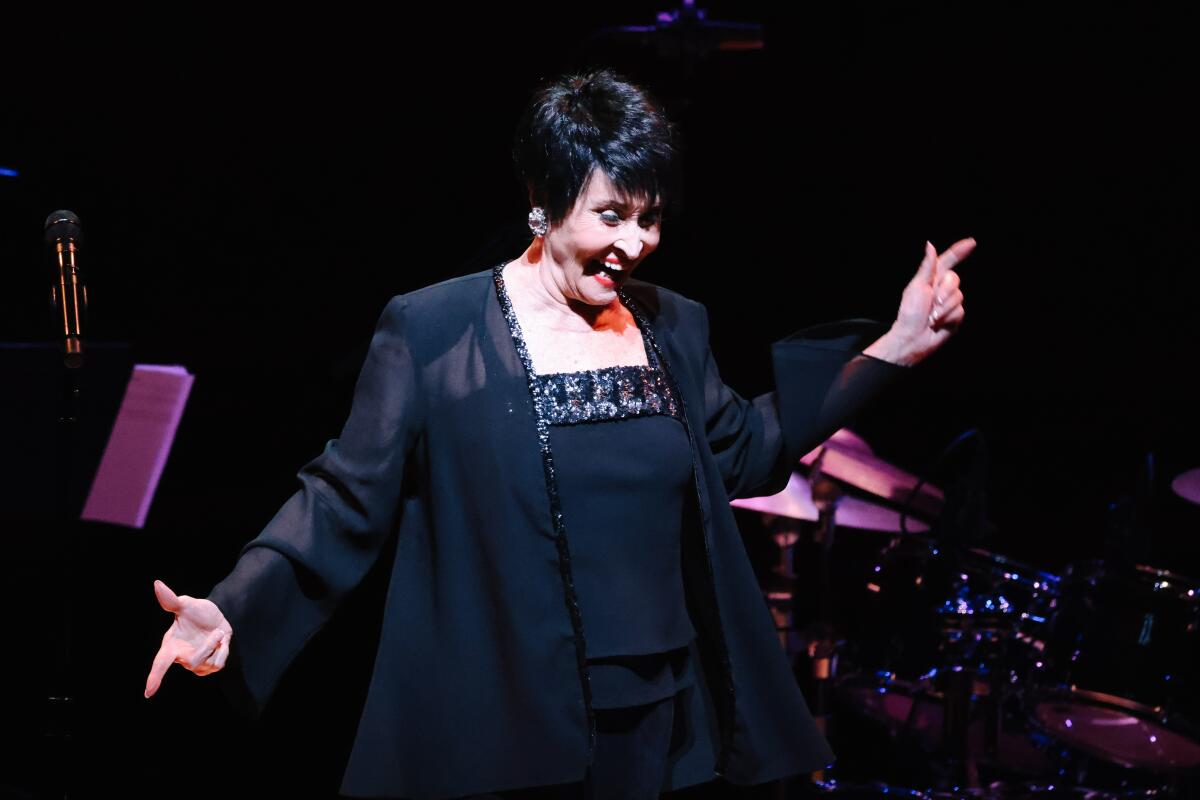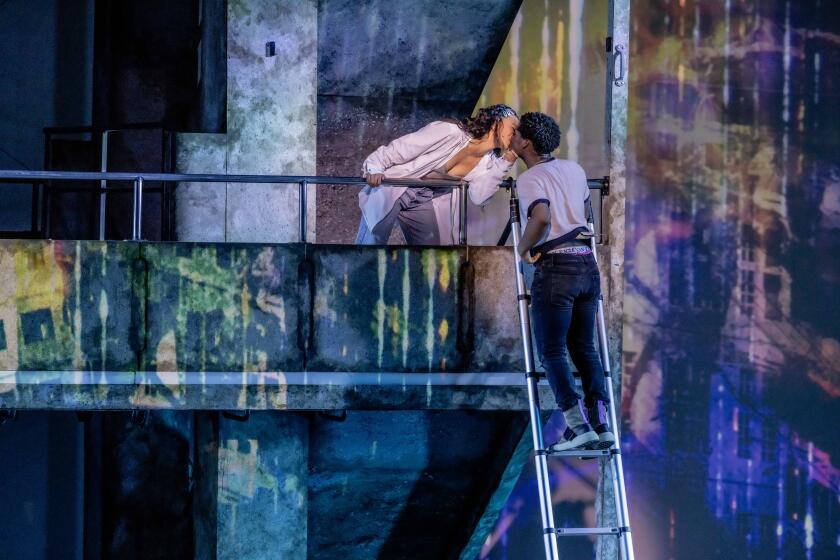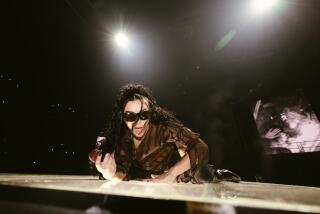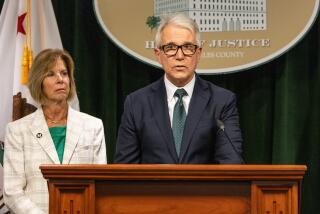Review: An icon forever, the magnetic Chita Rivera delivered sparks of magic at Segerstrom

Chita Rivera, Broadway’s most beloved triple threat, is a dancer in her soul.
Her path to stardom started as an itinerant chorus member. The expressiveness of her moves revealed a natural acting talent, and it wasn’t long before her collaborators convinced her that her singing voice was good enough for the spotlight.
But for all her virtuosity, it was her inner light that set her apart. Her characters have a way of deepening an audience’s appreciation of the human comedy. Game for any musical madness, she can shadow even the slightest silliness with an impression of lived truth.
To see Rivera in motion is to immediately fall under her spell. When she looked back at her career in her 2005 Broadway revue, the title of the show was “Chita Rivera: The Dancer’s Life” — life and dance being almost interchangeable for her.
A career-threatening car accident in 1986 couldn’t keep her from kicking those rehabbed legs to mesmerizing effect in “Can-Can.” But time is a force that not even the most physically gifted Broadway legend can overcome.
At 89, Rivera’s choreography is circumscribed to her hands and upper torso. Getting up on a stool is an occasion for deadpan. But if she moves and sings more gingerly than before, her stage aura is undiminished.
In “Chita: The Rhythm of My Life,” a cabaret she performed at the Segerstrom Center for the Arts’ Renée and Henry Segerstrom Concert Hall on Sunday, she threw off enough sparks of magic to make the show a tender get-together for her fans.
Rivera is a diva in stature but not in temperament. Her manner suffuses warmth and gratitude. She values the special connection with her audience, whom she includes among her “circle for friends.”
There’s no pretense in her pizzazz. She entertains by lifting up. The brief stories she told Sunday were of artists who graced her path. When her phone rang with an opportunity to work with a great, Rivera said yes, even if it meant that she would be playing not Liza Minnelli’s friend but her mother.
A medley of songs from “West Side Story,” the show that catapulted Rivera to fame, brought her back 65 years to memories of working with Leonard Bernstein, whose brilliance and handsomeness still clearly dazzle her. Rivera revealed that she married fellow cast member Tony Mordente even though he played a Jet and, as Anita, she was forbidden as a Shark to fraternize with those actors from the rival gang.
Daughter Lisa Mordente was invited onstage to perform with her mother in a duet of the John Kander-Fred Ebb number “Class” from “Chicago.” Rivera drolly recalled the tsking of matinee ladies at the song’s mildly naughty lyrics.
Rivera relied on her daughter and singer George Dvorsky to pad out the show. But the performance might have been stronger if she had opted for a more intimate tête-à-tête with the audience.
Mordente’s rendition of the Neil Sedaka hit “Breaking Up Is Hard to Do” wasn’t especially assured, and Dvorsky’s handling of the Kander and Ebb novelty song “Sara Lee,” a paean to richly fattening desserts, seemed a bit out of left field. Mordente made up for it later with a terrific imitation of Gwen Verdon, her mother’s partner in “Chicago,” and Dvorsky put his powerful voice at the service of an icon. But Rivera was who we came to see and hear.
Pat Benatar and Neil Giraldo’s musical version of Shakespeare’s ‘Romeo and Juliet’ at the Wallis Annenberg Center can’t escape the jukebox musical curse.
Kander and Ebb were naturally prominent on the setlist. Their musicals were inspired in part by Rivera’s range of talents, and she achieved some of her biggest triumphs in their shows. “Chicago,” of course, which blessed her not only with an ideal dance partner in Verdon but also with Bob Fosse, whose choreographic vocabulary became completely fluent when translated by Rivera’s body.
Rivera won Tony Awards for her performances in Kander and Ebb’s “The Rink” and “Kiss of the Spider Woman.” She performed songs from those shows, as well as from Kander and Ebb’s “The Visit,” from which she sang the concert’s most haunting number, “Love and Love Alone.”
The song dwells on the changes wrought by time that are experienced so acutely in romance. A melancholic appreciation of this reality, capacious enough to hold onto the good in the face of unavoidable loss, characterized Rivera’s attitude not just to these lyrics but to her own longevity as a performer.
Yet how the years dissolve when the pulse-quickening strains of “All That Jazz” race up and down her spine. Under the music direction of Michael Croiter and amicable piano accompaniment of Gary Adler, this Kander and Ebb classic once again galvanized a room with a timeless Rivera offering the hope that some joys can indeed live forever.
More to Read
The biggest entertainment stories
Get our big stories about Hollywood, film, television, music, arts, culture and more right in your inbox as soon as they publish.
You may occasionally receive promotional content from the Los Angeles Times.












